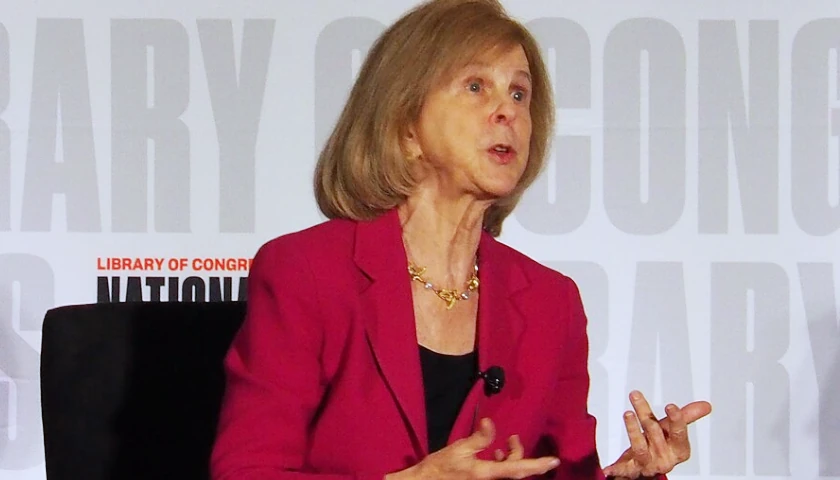Over at Instapundit, Mark Tapscott called my attention to an interview in our former paper of record that Times journo Nicholas Kristoff conducts with Elaine Pagels, the celebrated (by some) Princeton historian of religion.
Read MoreTag: Christianity
103 Things Higher Ed Declared Racist in 2024
Racism is the intentional mistreatment of someone on the basis of their race – at least in the normal world. But in academia, racism is anything producing disparities, according to Professor Ibram Kendi.
What follows is a long list of people, places, actions, and other things declared racist this year by higher ed, though a few came from K-12. If something needs “anti-racist” action or “diversity, equity, and inclusion,” it follows it must be racist, or else it would not need correction.
Read MoreFamily Fighting Back After Maryland Takes Child Away After Not Confirming ‘New Found Sexual Orientation’
John was out shopping for his youngest son’s birthday in July 2021 when he received a panicked call from his wife. A state child welfare worker and police officers were at their home, trying to take away their autistic son. The social worker claimed the Christian family’s refusal to affirm his apparently newfound sexual orientation was child abuse.
John raced home in time to record a video of the harrowing encounter.
Read MoreEx-Employee Sues City University of New York for Allegedly Firing Her After She Converted to Christianity
A former City University of New York (CUNY) staff member is suing the university for wrongfully terminating her employment after she converted to Christianity, according to a religious discrimination lawsuit filed last week.
Teona Pagan, who worked at CUNY’s Research Foundation as the Fellowships and Public Service Program Coordinator, alleges she was denied a religious accommodation for an aspect of her job that required her to recruit students for a fellowship focused on the promotion of LGBT “rights and causes,” according to the complaint filed Aug. 28. When Pagan converted to Christianity in April 2022 — months after beginning her job in November 2021 — she suddenly found her duties related to the fellowship in conflict with her sincerely held religious beliefs.
Read MoreCommentary: Christianity, Capitalism, and Colonialism Are Nothing to Be Ashamed Of
We’ve all heard the rhetorical attacks on Western Civilization—often centered on Christianity, capitalism, or colonialism, and often on all three. Among radical leftists, the consensus is that these elements are evil, but given that each is currently or historically integral to civilization as we know it, it’s worth examining the data to determine whether they deserve to be so despised.
First, Christianity. A 2018 study found that religion was “the decisive background factor” determining how much human rights were respected in any given country. And not all religions had the same impact. The percentage of Christians in the population was closely associated with a nation upholding human rights, whereas the percentage of Muslims was the opposite—that is, Muslim countries were less likely to uphold such rights. Another study reached similar conclusions about the effects of Christianity vis-à-vis Islam on nations’ ranking in the Good Country Index. (The index measures countries’ “contributions to global prosperity in domains such as peace, climate and health.”)
Read MoreCommentary: Easter Is the Greatest Holiday of All Time
Among world religions, only Christianity has a founder who professed to be the Messiah—the Son of God—who gave his life to save mankind.
The Easter weekend starts with Good Friday, the day God’s son Jesus was crucified to fulfill His plan to provide salvation from sin for those who believe in Christ. Easter Sunday is the celebration of Christ’s resurrection, the third day from his crucifixion death, and the completion of God’s plan for all to know who Jesus was.
Read MoreCommentary: The Resurrection of Jesus Is the Most Important Event in History
Christians around the world will commemorate the most important event in our faith’s history this Sunday, but the Resurrection of Jesus isn’t just important to those who believe a Nazarene who walked the earth 2,000 years ago is the Son of God. The secular world’s history also turns on this pivotal event, which inspired so much progress that we take for granted today.
Christianity turned the values of the Pagan Roman world upside-down. The Romans considered the early Christians subversives—many called them “atheists” because they didn’t worship any pagan gods—and put them to death for refusing to worship the emperor. After some emperors adopted the faith, Emperor Julian attempted to revive paganism, but lamented that the Christian ethic had transformed the empire.
Read MoreCommentary: Americans Embrace Religion, Reject Religious Bigotry
More than half a century ago, Time magazine famously asked, “Is God Dead?” The black and red cover, the magazine’s first to include only text, sparked countless angry sermons and thousands of letters from readers accusing Time of engaging in tasteless nihilism, Marxist pandering, and outright blasphemy.
The question, which typified the counter-culture movement and the intellectual radicalism of the 1960s, was far off the mark both then and now. The United States has always been and remains a very religious nation despite steep declines in attendance at churches, synagogues, and mosques – trends that have captured far more headlines in recent years than the nation’s enduring faith. America is also a majority Christian nation, though other religious groups and affiliations and those identifying as non-believers are growing.
Read More






